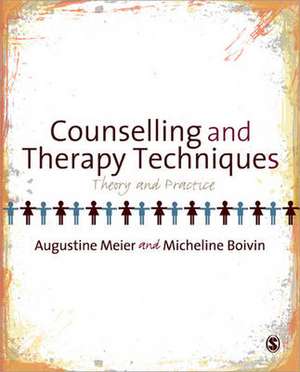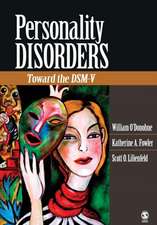Counselling and Therapy Techniques: Theory & Practice
Autor Augustine Meier, Micheline Boivinen Limba Engleză Paperback – 14 oct 2010
- presents each technique from the perspective of its underlying theory;
- gives practical instruction on how to deliver each intervention;
- provides extracts from counselling sessions to demonstrate the technique in action.
This book is crucial reading for all trainees on counselling and psychotherapy courses or preparing to use counselling techniques in a range of other professional settings. It is also helpful for professionals who wish to acquire additional skills.
Augustine Meier, certified clinical psychologist, professor Emeritus, Faculty of Human Sciences, Saint Paul University, Ottawa, Ontario and Founder and President of the Ottawa Institute for Object Relations Therapy.
Micheline Boivin, certified clinical psychologist, Psychological Services of the Family, Youth and Children's Program at the Centre for Health and Social Services, Gatineau, Québec.
Preț: 341.20 lei
Nou
Puncte Express: 512
Preț estimativ în valută:
65.29€ • 68.17$ • 54.03£
65.29€ • 68.17$ • 54.03£
Carte disponibilă
Livrare economică 15-29 martie
Livrare express 01-07 martie pentru 30.96 lei
Preluare comenzi: 021 569.72.76
Specificații
ISBN-13: 9781847879585
ISBN-10: 1847879586
Pagini: 192
Ilustrații: black & white tables, figures
Dimensiuni: 186 x 232 x 11 mm
Greutate: 0.36 kg
Ediția:1
Editura: SAGE Publications
Colecția Sage Publications Ltd
Locul publicării:London, United Kingdom
ISBN-10: 1847879586
Pagini: 192
Ilustrații: black & white tables, figures
Dimensiuni: 186 x 232 x 11 mm
Greutate: 0.36 kg
Ediția:1
Editura: SAGE Publications
Colecția Sage Publications Ltd
Locul publicării:London, United Kingdom
Recenzii
'This original and sophisticated book provides advanced students with a focused introduction to the main schools of counselling, offering detailed, accurate and highly specific information about each counselling technique. Ideal reading for postgraduate psychology students, counselling psychology trainees or trainee counsellors, I would recommend this book for my students.' - Dr Fiona Starr, Chartered Clinical Psychologist and Principal Lecturer, School of Health and Social Sciences, Middlesex University
'This book is a pleasure to read. Written in an easy-to-follow format the contents provide the reader with not only the theory of each technique but more importantly the ways in which it can be used. Therapists will find this a useful addition to their bookshelves and to their therapeutic work in general. As someone who taught on Diploma and Masters programmes in Counselling, this book will also be of considerable use to trainee therapists and tutors alike.' - Gladeana McMahon, Co-Director, Centre for Stress Management and Chair of the Association for Coaching UK
'This book is a pleasure to read. Written in an easy-to-follow format the contents provide the reader with not only the theory of each technique but more importantly the ways in which it can be used. Therapists will find this a useful addition to their bookshelves and to their therapeutic work in general. As someone who taught on Diploma and Masters programmes in Counselling, this book will also be of considerable use to trainee therapists and tutors alike.' - Gladeana McMahon, Co-Director, Centre for Stress Management and Chair of the Association for Coaching UK
Cuprins
Theoretical Bridges and the Psychotherapy Process
Introduction
Epistemological Foundations
Psychotherapeutic Content - Client Experiences
Encoding Experiences
Psychic Organisations and Processes
Target of Change: Behaviour or Reworking and Rebuilding Psychic Organizations
Phases of the Change Process and Techniques
Techniques and the Therapeutic Relationship
Therapist - Client Collaboration
Discriminate Use of a Technique
Ethical Considerations and the Use of Techniques
References
Empathic Responses
Introduction
Empathy: Origin and Definitions
Theoretical Aspects
Measuring Accurate Empathy
The Technique of Empathic Responding
Guidelines for Formulating and Communicating Empathic Responses
Common Problems and Empathic Inhibitors
Illustration: Tania
References
The Experiential Focusing Technique
Introduction
Theoretical Aspects
The Practice of Experiential Focusing
Illustration: Simone
References
The Gestalt Empty-Chair and Two-Chair Techniques
Introduction
Part 1: Personality Organization and Processes
Primary Motivating Factor
Contact and Contact Boundary
Stages of Personality Development
Subsystems of Personality
Processes of Personality Development
Organismic Self-Regulation
Boundary Disturbances
Therapeutic Goals, Role of Therapist and Techniques
Part 2: The Gestalt Empty-Chair Technique
Unfinished Business
The Gestalt Empty-Chair Technique in Action
Illustration: Robert
Part 3: The Gestalt Two-Chair Technique
Theoretical Aspects
Procedures Using the Gestalt Two-Chair Technique
Illustration: Rick
Conclusion
References
The Use of Metaphors in Therapy
Introduction
Metaphor: Definition, Structure, and Power
Client-Generated Metaphors
Types of Client-Generated Metaphors
Techniques to Unravel Metaphors
Eliciting and Exploring Client-Generated Metaphors
Pitfalls in Using Metaphors
Ethical Considerations
Illustration: Karen
References
Task-Directed Imagery
Introduction
Imagery in Context
Task-Directed Imagery
Illustration: Maylyn
References
Ego-State Therapy
Introduction
Ego States: Major Concepts, Development, and Activation
The Practice of Ego-State Therapy
Illustration: Sonja
References
Solution-Focused Therapy
Introduction
Theoretical Aspects
The Practice of Solution-Focused Therapy
Procedures for Doing Solution-Focused Therapy
Illustration: Colleen
References
Cognitive-Behavioural Therapy
Introduction
Part 1: Theoretical Aspects
Theory of Personality
Theory of Psychopathology
Part 2: Psychotherapy Procedures and Techniques
Goal of Therapy
Fundamental Clinical Processes
Psychotherapeutic Techniques
Part 3: Working with Automatic Thoughts
Procedures
Illustration: Sébastien
Part 4: Working with Schemas
Classification of Schemas
Schema Processes
Procedures
Illustration: Sébastien
References
Narrative Therapy
Introduction
Theoretical Influences
Theoretical Aspects
The Practice of Narrative Therapy
Method in Working with Narratives
Ethical Considerations
Illustration: Sonja
References
Self-in-Relationship Psychotherapy
Introduction
Major Concepts and Processes
Therapeutic Process
Illustration: Sofía
References
Introduction
Epistemological Foundations
Psychotherapeutic Content - Client Experiences
Encoding Experiences
Psychic Organisations and Processes
Target of Change: Behaviour or Reworking and Rebuilding Psychic Organizations
Phases of the Change Process and Techniques
Techniques and the Therapeutic Relationship
Therapist - Client Collaboration
Discriminate Use of a Technique
Ethical Considerations and the Use of Techniques
References
Empathic Responses
Introduction
Empathy: Origin and Definitions
Theoretical Aspects
Measuring Accurate Empathy
The Technique of Empathic Responding
Guidelines for Formulating and Communicating Empathic Responses
Common Problems and Empathic Inhibitors
Illustration: Tania
References
The Experiential Focusing Technique
Introduction
Theoretical Aspects
The Practice of Experiential Focusing
Illustration: Simone
References
The Gestalt Empty-Chair and Two-Chair Techniques
Introduction
Part 1: Personality Organization and Processes
Primary Motivating Factor
Contact and Contact Boundary
Stages of Personality Development
Subsystems of Personality
Processes of Personality Development
Organismic Self-Regulation
Boundary Disturbances
Therapeutic Goals, Role of Therapist and Techniques
Part 2: The Gestalt Empty-Chair Technique
Unfinished Business
The Gestalt Empty-Chair Technique in Action
Illustration: Robert
Part 3: The Gestalt Two-Chair Technique
Theoretical Aspects
Procedures Using the Gestalt Two-Chair Technique
Illustration: Rick
Conclusion
References
The Use of Metaphors in Therapy
Introduction
Metaphor: Definition, Structure, and Power
Client-Generated Metaphors
Types of Client-Generated Metaphors
Techniques to Unravel Metaphors
Eliciting and Exploring Client-Generated Metaphors
Pitfalls in Using Metaphors
Ethical Considerations
Illustration: Karen
References
Task-Directed Imagery
Introduction
Imagery in Context
Task-Directed Imagery
Illustration: Maylyn
References
Ego-State Therapy
Introduction
Ego States: Major Concepts, Development, and Activation
The Practice of Ego-State Therapy
Illustration: Sonja
References
Solution-Focused Therapy
Introduction
Theoretical Aspects
The Practice of Solution-Focused Therapy
Procedures for Doing Solution-Focused Therapy
Illustration: Colleen
References
Cognitive-Behavioural Therapy
Introduction
Part 1: Theoretical Aspects
Theory of Personality
Theory of Psychopathology
Part 2: Psychotherapy Procedures and Techniques
Goal of Therapy
Fundamental Clinical Processes
Psychotherapeutic Techniques
Part 3: Working with Automatic Thoughts
Procedures
Illustration: Sébastien
Part 4: Working with Schemas
Classification of Schemas
Schema Processes
Procedures
Illustration: Sébastien
References
Narrative Therapy
Introduction
Theoretical Influences
Theoretical Aspects
The Practice of Narrative Therapy
Method in Working with Narratives
Ethical Considerations
Illustration: Sonja
References
Self-in-Relationship Psychotherapy
Introduction
Major Concepts and Processes
Therapeutic Process
Illustration: Sofía
References
Descriere
Counselling and Therapy Techniques covers all the major counselling approaches and provides all the tools required for developing a therapeutic relationship with clients.






